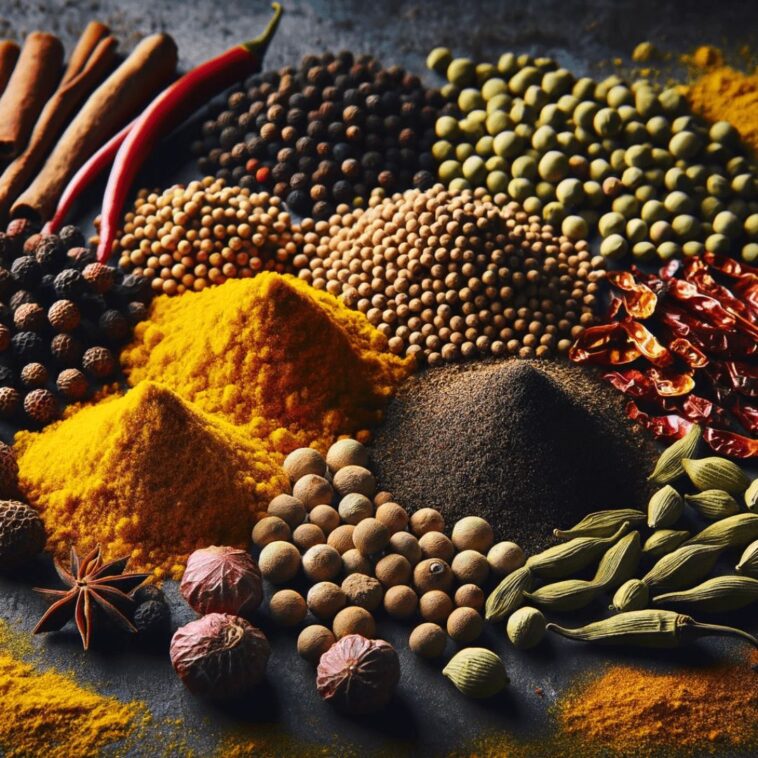High uric acid levels in the body can lead to gout and other health issues. Uric acid is a waste product found in the blood, created when the body breaks down purines, substances found in various foods and drinks. When the body produces too much uric acid or fails to eliminate it efficiently, it can crystallize and deposit in the joints, causing intense pain and inflammation. While medication can help manage these levels, incorporating certain natural remedies into your diet can be highly effective. Indian spices, known for their medicinal properties, can play a significant role in lowering uric acid. Fortunately, these spices are readily available in the USA. Let’s explore six Indian spices that can help you maintain healthy uric acid levels.
-
Turmeric
Turmeric, a staple in Indian cuisine, is renowned for its anti-inflammatory properties. The active ingredient, curcumin, helps reduce inflammation and lower uric acid levels. Research suggests that curcumin’s powerful antioxidant effects can inhibit the production of certain enzymes that lead to inflammation, making it an excellent remedy for conditions like gout. You can incorporate turmeric into your daily diet by adding it to curries, soups, or even smoothies.
How to Use:
– Add a teaspoon of turmeric to your morning smoothie for a golden boost.
– Use it in cooking curries or soups to impart a vibrant color and earthy flavor.
– Make a soothing turmeric tea by boiling water, adding a teaspoon of turmeric, and a dash of black pepper, which enhances curcumin absorption.
-
Ginger
Ginger is another powerful spice that can help manage uric acid levels. Its anti-inflammatory properties aid in reducing the pain and swelling associated with high uric acid. Studies have shown that ginger can decrease uric acid levels and improve kidney function, which is essential for uric acid elimination. Ginger can be consumed fresh, dried, or in powder form, making it a versatile addition to your diet.
How to Use:
– Brew ginger tea by boiling fresh ginger slices in water, adding a bit of honey and lemon for taste.
– Add ginger to your stir-fries and soups to enhance flavor and reap health benefits.
– Include ginger powder in your baking recipes for a spicy kick.
-
Cumin
Cumin seeds, commonly used in Indian cooking, can also help lower uric acid levels. They are rich in antioxidants and have anti-inflammatory effects that can aid in managing gout and other uric acid-related issues. Cumin’s ability to improve digestion can also help in reducing the buildup of uric acid in the body.
How to Use:
– Add cumin seeds to your lentil dishes and curries for a nutty, earthy flavor.
– Use ground cumin as a seasoning for meats and vegetables, enhancing both taste and health benefits.
– Include cumin in your salad dressings for an added flavor boost and a dose of antioxidants.
-
Fenugreek
Fenugreek seeds have been used in traditional medicine for centuries. They contain compounds that help in reducing uric acid levels and have anti-inflammatory properties. Fenugreek seeds can also improve insulin sensitivity and aid in digestion, both of which are crucial for managing uric acid levels. Fenugreek seeds can be used whole, ground, or sprouted, offering various culinary possibilities.
How to Use:
– Soak fenugreek seeds overnight and consume them on an empty stomach to kickstart your day with a health boost.
– Add ground fenugreek to your curries and bread dough to enhance flavor and nutritional value.
– Use fenugreek sprouts in salads and sandwiches for a crunchy, healthful addition.
-
Cinnamon
Cinnamon is not only a delicious spice but also beneficial for reducing uric acid levels. It helps in improving insulin sensitivity, which can indirectly affect uric acid levels. Additionally, cinnamon’s anti-inflammatory and antioxidant properties can help reduce the pain and swelling associated with gout.
How to Use:
– Sprinkle cinnamon on your oatmeal or yogurt for a warm, spicy flavor.
– Add a cinnamon stick to your tea or coffee for a fragrant and healthful twist.
– Use ground cinnamon in baking recipes to infuse your treats with both flavor and health benefits.
-
Black Pepper
Black pepper, often referred to as the “king of spices,” has numerous health benefits, including lowering uric acid levels. Piperine, the active compound in black pepper, enhances the absorption of other nutrients, making it a great addition to your diet. Its antioxidant properties can also help in reducing inflammation and supporting overall health.
How to Use:
– Season your dishes with freshly ground black pepper to enhance flavor and health benefits.
– Add black pepper to marinades and salad dressings for a spicy kick.
– Sprinkle black pepper on your eggs or avocado toast for a simple yet effective way to incorporate it into your diet
Incorporating these six Indian spices into your daily diet can help manage uric acid levels naturally. They are easily available in the USA and can be used in various culinary preparations. Embracing natural remedies offers a holistic approach to health and can complement medical treatments effectively. However, it’s important to remember to consult with a healthcare professional before making significant changes to your diet, especially if you have underlying health conditions. Embrace the power of natural remedies and enjoy the numerous health benefits these spices offer, promoting a healthier, more balanced life.




GIPHY App Key not set. Please check settings